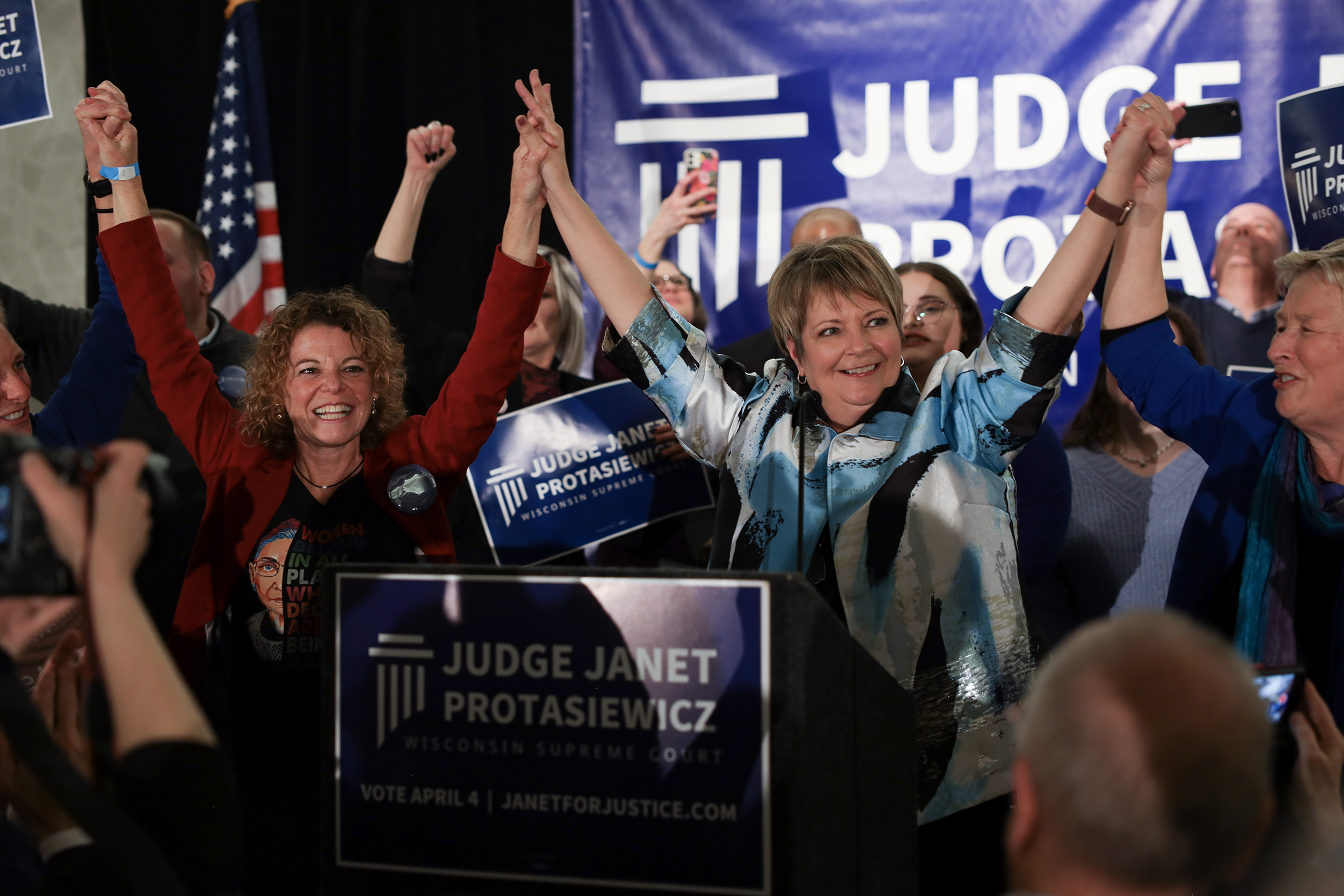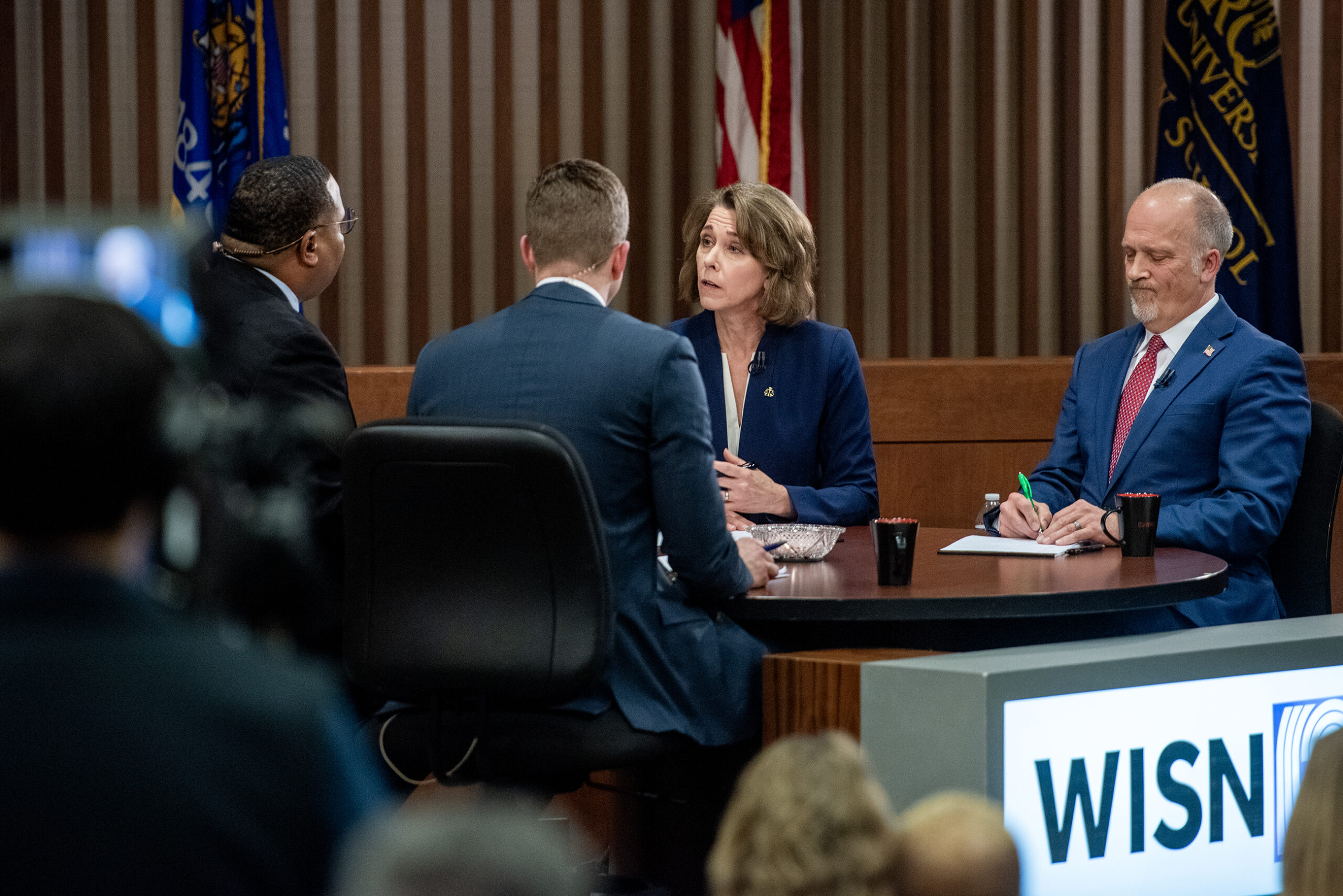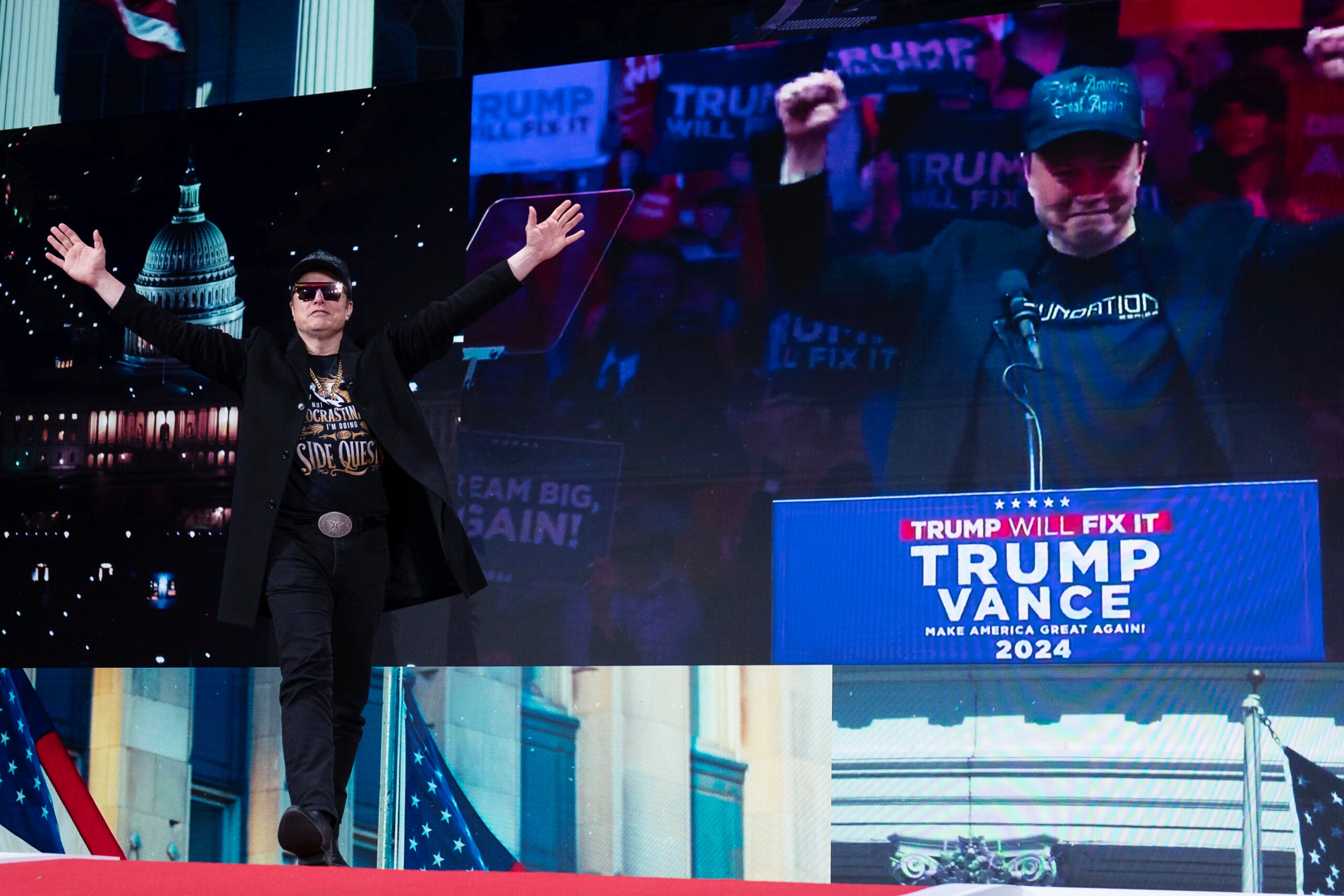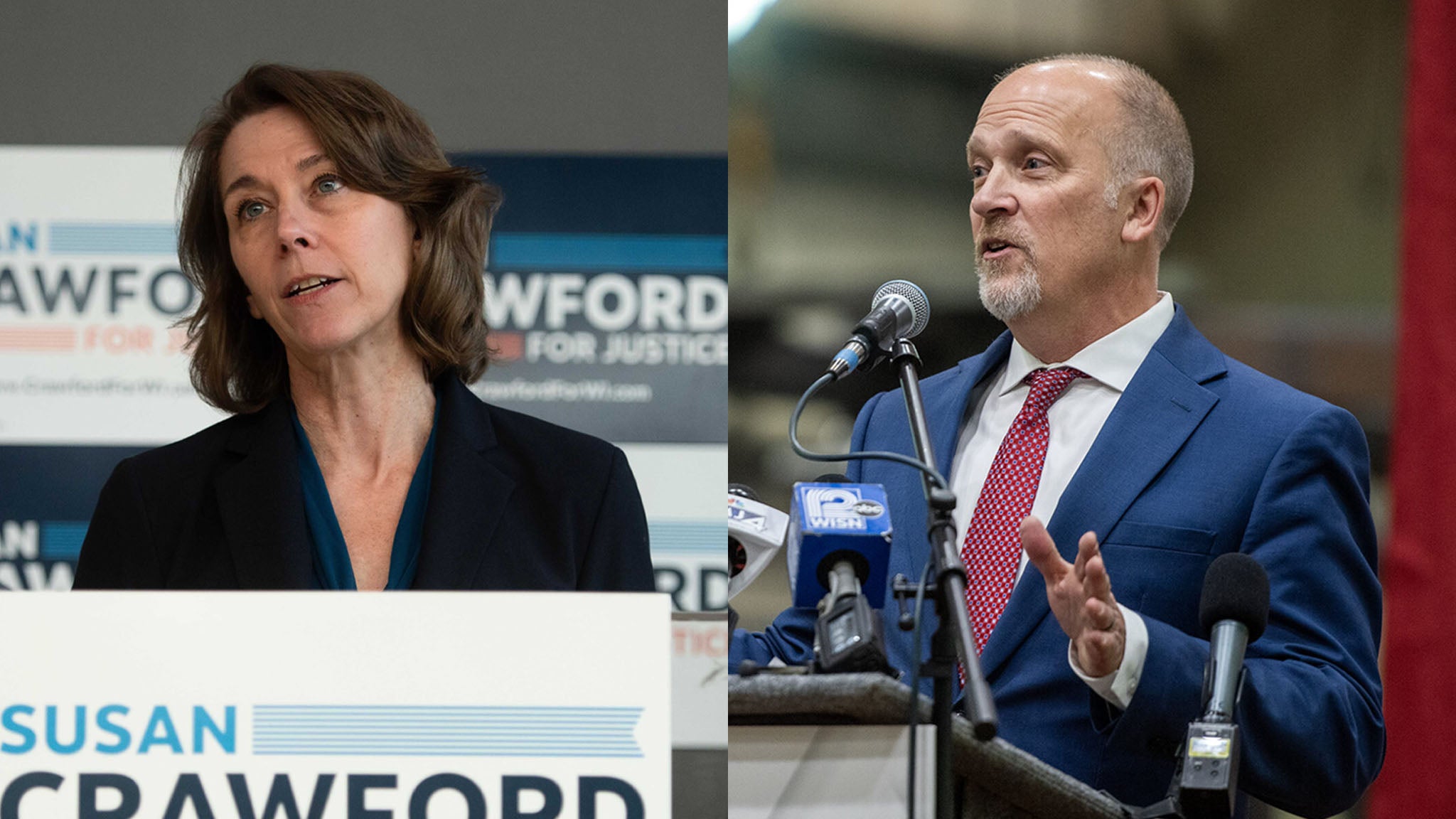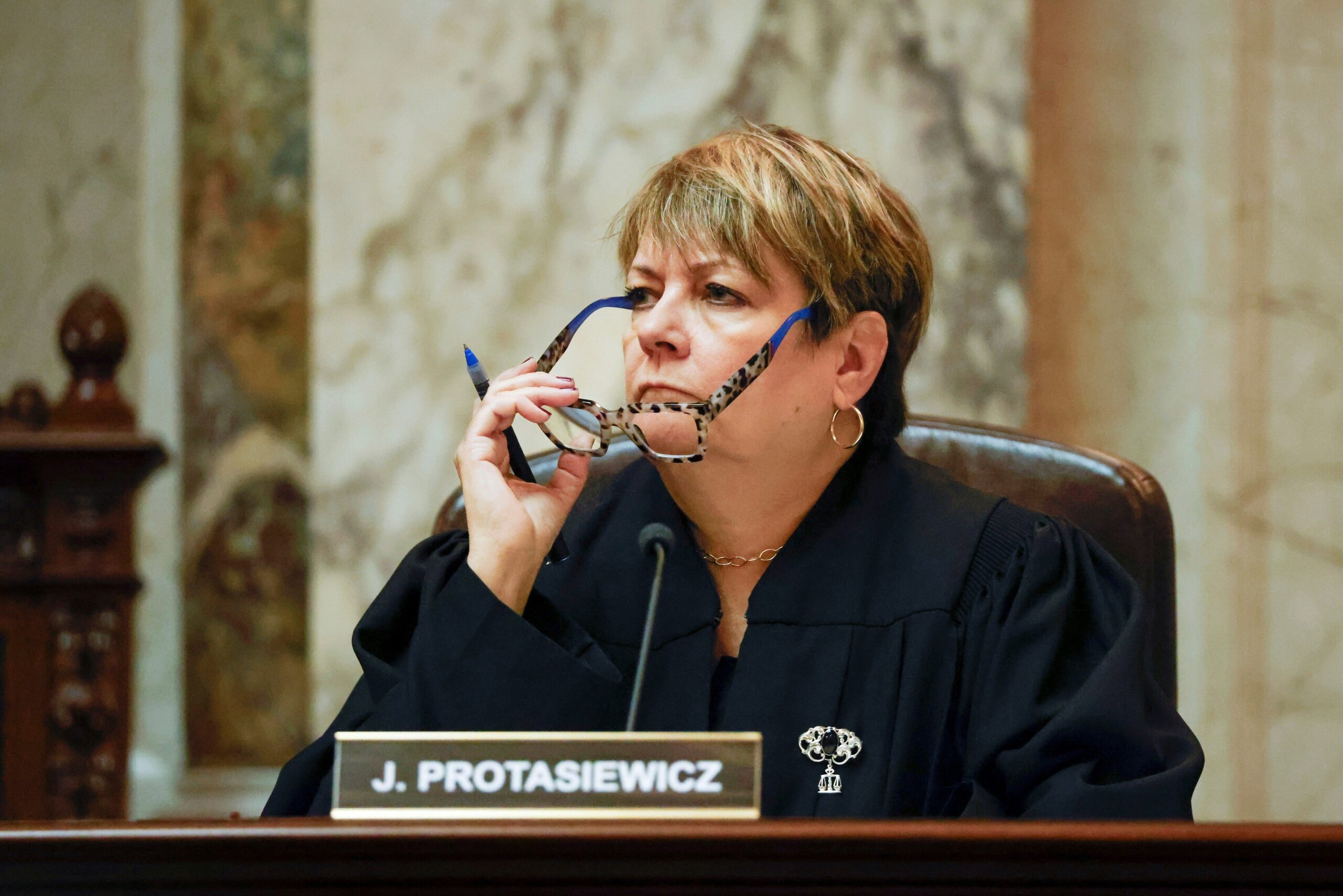Battle lines are being drawn as Republican state lawmakers threaten to impeach Wisconsin Supreme Court Justice Janet Protasiewicz if she doesn’t recuse herself from redistricting lawsuits that could chip away at the GOP’s majorities in the state Legislature.
Protasiewicz has yet to hear a case. But Republicans say she’s already shown her hand as it relates to two lawsuits filed on behalf of Democratic voters seeking to redraw Wisconsin’s Assembly, Senate and Congressional maps.
They have called on Protasiewicz to recuse herself from those cases, pointing to her comments on the campaign trail about the current GOP drawn maps being “rigged,” and the fact that she received around $10 million in donations from the Democratic Party of Wisconsin.
Stay informed on the latest news
Sign up for WPR’s email newsletter.
In August, Assembly Speaker Robin Vos, R-Rochester, said GOP lawmakers might consider impeaching Protasiewicz if she refuses to step aside.
The state Democratic Party is now launching a $4 million ad campaign aimed at pressuring Republican lawmakers to back away from impeachment.
Protasiewicz, a liberal-leaning former Milwaukee County judge, defeated former conservative Supreme Court Justice Dan Kelly by 11 percentage points April 4. That win gave liberals control of the Supreme Court for the first time in 15 years.
During her campaign, Protasiewicz said she would recuse herself from cases brought forward by the Democratic Party of Wisconsin. But such recusals are not obligated to by state ethics rules, which say campaign contributions do not create a conflict of interest that would require a judge to step aside from a case.
And a U.S. Supreme Court decision from 2002 ruled that judges have First Amendment protections while campaigning allowing them to express opinions about issues of the day.
Protasiewicz never stated how she would rule on any of the high-profile cases expected to land before the Wisconsin Supreme Court in the next several years. In addition to the partisan maps case, she’s expected to hear cases about abortion and voting access. She did repeatedly share what she described as her personal values, including stating that she supports abortion rights.
A Wisconsin judge has only been impeached one time in state history, in 1853. Legal experts say the threat to bring impeachment proceedings against Protasiewicz could promote the idea that lawmakers can act against jurists who rule against their preferences.
Former Wisconsin Supreme Court Justice Janine Geske, who was appointed to the court twice by Republican governors, told WPR that Vos’ threat is a “terrible statement” about the state politics in Wisconsin government.
“There was talk about impeachment before she was even elected and she hasn’t done anything at this point,” Geske said. “And the talk about, ‘We’re going to impeach her if she does something,’ is really just threatening a judge.”
What are recusal, impeachment standards in Wisconsin?
The decision to recuse from a case is largely up to individual judges and justices in Wisconsin.
Chapter 60 of Wisconsin’s Code of Judicial Conduct “requires a judge to recuse if the judge has made a public statement while campaigning that commits the judge with respect to an issue in the proceeding,” said Rob Yablon, who co-directs the State Democracy Research Initiative at UW-Madison.
But the code also says a judge does not have to recuse “based solely on any endorsement or the judge’s campaign committee’s receipt of a lawful campaign contribution, including a campaign contribution from an individual or entity involved in the proceeding.”
“Simply expressing views or opinions on legal issues is not a commitment that requires recusal,” explained Yablon.
In 2017, Geske and dozens of judges from around Wisconsin petitioned the Supreme Court to create “an objective standard requiring recusal or disqualification of a judge” when they’ve received campaign contributions “from a party or lawyer.”
The court’s conservative majority, including current Chief Justice Annette Zeigler and Justice Rebecca Bradley, rejected the petition, stating the changes would infringe on the constitutional rights of Wisconsinites to support candidates running for office.
At the time, Bradley wrote that she knows “that the judges and justices in this state strive every day to fulfill that oath to render impartial justice.”
“And if any judge fails to do so, if a judge does not act with impartiality and integrity, that judge will answer to the people of Wisconsin on their election day,” wrote Bradley. “And that’s the beauty of our system of an elected judiciary, which our state has had for about 170 years.”
State statute also specifies that any judge in Wisconsin “shall disqualify himself or herself” from any case when they have “a significant financial or personal interest” or they determine “he or she cannot, or it appears he or she cannot, act in an impartial manner.”
On Wednesday, Protasiewicz released a letter from the Wisconsin Judicial Commission stating that “several complaints” alleging her campaign comments on redistricting and Wisconsin’s near-total abortion ban violated the judicial code have been dismissed.
In response, Vos issued a statement claiming the commission’s finding “only muddies the waters” and does not address whether she can sit on the redistricting cases.
Legal arguments filed for and against Protasiewicz recusal
In the two lawsuits seeking new voting maps, attorneys representing Democratic voters and the Wisconsin Legislature have filed motions honing in on those statutes and the U.S. Constitution’s Due Process Clause while arguing for and against Protasiewicz recusal.
In a filing, Kevin St. John, who is representing the Legislature, argues the Due Process clause doesn’t allow a judge to sit on a case “when her participation creates a serious risk of actual bias or prejudgment of the merits.”
“The risk of actual bias exists here because the Democratic Party of Wisconsin, the primary and intended beneficiary of Petitioners’ claims, was the main contributor to Justice Protasiewicz’s campaign for a seat on this Court, providing almost $10 million of the $16.7 million spent by her campaign,” wrote St. John. “Moreover, Justice Protasiewicz’s public campaign statements reveal that she has prejudged the merits of this case.”
Attorney Sarah Zylstra, representing Democratic voters, countered by stating “the constitutional standard for recusal is extraordinarily high and is not met here.” She argues a 2009 case in which the U.S. Supreme Court ruled that a West Virginia Supreme Court of Appeals justice should have recused himself from a case does not apply to Protasiewicz. In that situation, the West Virginia judge had refused to recuse himself in a case in which a $50 million jury verdict levied against a coal company was overturned after the judge received a $3 million donation from the company’s CEO
“Here, the source of the contributions is the Democratic Party of Wisconsin, which is not a party to this litigation,” wrote Zylstra. “Moreover, the risk of intolerable bias is far higher where the source of the contributions is a single high-ranking executive of a single corporation that has been directly financially harmed by a specific case under review than it is when the source of the contributions is a diffuse political-party organization that aggregates thousands of contributions from individual donors who coalesce around a broad range of public-policy concerns.”
How does impeachment work in Wisconsin?
Any civil officer in Wisconsin can be impeached by state lawmakers for “corrupt conduct in office or for the commission of a crime or misdemeanor.” Protasiewicz has not been accused of corruption or committing a crime.
If a simple majority of the State Assembly votes to impeach Protasiewicz, it would be up to the State Senate to hold a trial. Acting as a court, Senators would consider evidence and could convict the justice with a two-thirds vote.
In the interim between an Assembly vote to impeach and the conclusion of the Senate trial, Protasiewicz would not be allowed to sit on the Supreme Court.
By the numbers, Republicans have enough members in both chambers to succeed in removing Protasiewicz, but it’s not clear whether enough members of the GOP caucus would want to go that route. Soon after Protasiewicz won the April election, Wisconsin Senate Majority Leader Devin LeMahieu told WISN-TV, “To impeach someone, they would need to do something very serious.”
“We are not looking to start the impeachment process as a regular occurring event in Wisconsin,” LeMahieu.
Senate Republicans are reportedly discussing impeachment options during a closed caucus meeting Wednesday. WPR did not receive a response after reaching out to LeMahieu’s office for comment on where senators stand.
Former Justice Geske told WPR she has faith that Legislators, regardless of party affiliation, “would never vote to impeach her (Protasiewicz) for taking a position on a case that is lawful.”
“And there is no question that regardless of what she does, it’ll be lawful in proceeding on the case,” Geske said.
Democratic Party pushing back
While Republican lawmakers consider impeachment, the Democratic Party of Wisconsin is launching a $4 million ad blitz aimed at encouraging residents to pressure GOP members to back away from the idea.
During a press conference with reporters Wednesday evening, Democratic Party Chair Ben Wikler said the threat alone represents a “nuclear football.”
“Speaker Vos has publicly threatened, in an act of political extortion, a sitting Supreme Court justice with impeachment, an unprecedented, unconstitutional, impeachment if she were to carry out her job in a way that Robin Vos deems unfit,” Wikler said.
The party plans to spend $1 million on a statewide organizing and mobilization strategy and expects to receive another $3 million from unnamed, “allied groups.”
“Every legislator at this moment has to look in the mirror and ask if they are willing to sign a death warrant for democracy in our state,” said Wikler.
Vos reacted to the plan with a statement claiming it proves Protasiewicz and the state Democratic Party “are one in the same.”
“The timing of yesterday’s order from Justice Protasiewicz and the Democrat (sic) Party’s immediate press conference announcing $4 million dollars in attack ads supporting Justice Protasiewicz’s involvement is further indication of coordination between the two,” said Vos.
Impeachment precedents in other states
This is not the first instance of a state Legislature acting against an elected judge’s public comments about issues that might come before them in court.
Douglas Keith, an attorney and courts expert with the Brennan Center for Justice, said those efforts have often faced bipartisan pushback.
“That’s because there’s been a bipartisan understanding that the impeachment power is not about removing judges that you just don’t like, it’s about removing judges for misconduct,” he said.
In a case that parallels Wisconsin’s, Republican lawmakers in Pennsylvania attempted to impeach high court justices there in 2018, after they ruled the state constitution prohibited partisan gerrymandering, thus striking down existing legislative maps. One of the Democratic justices in that case who – like Protasiewicz – described the Pennsylvania maps as rigged, had also been called on to recuse himself from that case and declined to do so.
The effort to impeach the Democratic jurists there failed after pushback, including criticism by the court’s Republican chief justice, who described threats of impeachment as “an attack upon an independent judiciary.”
Another similar legal situation to Wisconsin’s is unfolding in North Carolina, where state lawmakers launched an investigation into a justice’s public comments about diversity. Lawmakers there have said those comments could constitute bias; Justice Anita Earls has filed suit, saying she is defending “her right to speak on matters of public concern.”
And while state and national legal precedent establishes that justices can express personal opinions, campaigns for public office put those statements, as well as campaign finances, under scrutiny.
“Elections mean campaigns. Campaigns mean that money is spent, and statements are made on the campaign trail,” said Yablon.
But, he said, the US Supreme Court case Republican Party of Minnesota vs. White, found that judges’ campaign statements do not affect their impartiality on the bench.
Nevertheless, situations like the one unfolding around Wisconsin’s highest court illustrate the heightened stakes at state courts generally, said Keith, the Brennan Center attorney.
“There is a greater recognition of the fact that these courts are going to be deciding some of the highest profile political and legal matters of the day,” he said.
With that recognition, he said, comes the risk that “judicial ethics bodies and judicial ethics tools are being used to punish justices that other officials in the state don’t seem to agree with, or just don’t want deciding cases.”
Wisconsin Public Radio, © Copyright 2025, Board of Regents of the University of Wisconsin System and Wisconsin Educational Communications Board.

